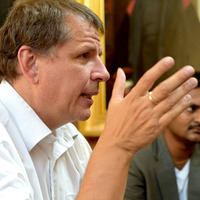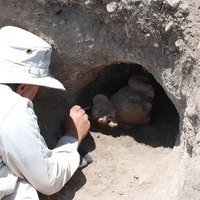
Atreyee Majumder
I am currently Associate Professor (Social Sciences) at the National Law School of India University, Bengaluru. I received my PhD from the Department of Anthropology at Yale in 2014 and have been an Andrew W. Mellon Postdoctoral Fellow at the Jackman Humanities Institute, University of Toronto (2016-18). My research examines the formation of subjects and the production of the spatial form of small towns in India, and their interrelationships, under conditions of late capitalism in the postcolony. My ethnographic research has shown me that spatial experience engenders a peculiar register of expression. I examine such registers and their ways of articulating spatial selves in culture, music, print, and in registers of speech. I have conducted fieldwork in two urban geographies in India: in Howrah, a deindustrialized town and district in eastern India, and in and around Vrindavan, in the sacred geography of Krishna worship in northern India.
My transition from an undergraduate degree and a career in law to anthropology emerged from an interest in the legal and political turmoil in India over redesignation of agrarian and forest land to infrastructure and other market-driven projects under the sign of development. As I went into the field of industrial geographies of eastern India, I found hidden, older histories of lives lived around architectures of manufacture. This ethnographic research, supported by a Junior Fellowship from the American Institute of Indian Studies, culminated in my first monograph, Time, Space, and Capital in India (Routledge, 2018; paperback 2020).
My transition from an undergraduate degree and a career in law to anthropology emerged from an interest in the legal and political turmoil in India over redesignation of agrarian and forest land to infrastructure and other market-driven projects under the sign of development. As I went into the field of industrial geographies of eastern India, I found hidden, older histories of lives lived around architectures of manufacture. This ethnographic research, supported by a Junior Fellowship from the American Institute of Indian Studies, culminated in my first monograph, Time, Space, and Capital in India (Routledge, 2018; paperback 2020).
less
Related Authors
Benjamin Noys
University of Chichester
Richard Bellamy
University College London
David Seamon
Kansas State University
James Mallinson
University of Oxford
Philipp A Maas
Leipzig University (Universität Leipzig)
Noe Cornago
University of the Basque Country, Euskal Herriko Unibertsitatea
Gary Feinman
Field Museum
Carole Cusack
The University of Sydney
Veena Das
Johns Hopkins University
Karl Baier
University of Vienna
InterestsView All (7)










Uploads
Papers by Atreyee Majumder
The essays in the volume trace liberalism's journey through modern Indian history to give us a new standpoint to understand current debates and also point to some internal contradictions of Indian liberalism.
The volume will be of importance to scholars and researchers of political science, especially political theory, and South Asian studies.
This book is fundamentally concerned with the relations among the theoretical categories of time, space and capital in India and shows registers of temporality and spatiality generated by historical phases of interaction with industrial capital. Based on extensive ethnographic fieldwork in Howrah, the author examines the form of urbanism that is not linked to the city-form of spatial organization, a "hinterland urbanism". The book brings out the theoretical implications by showing the relations among time, space and capital. Through a series of encounters and interceptions with a number of voices arising, the book sheds light on the issue and identifies the state of an ethnographer who is ensconced in the field – in wonder, conceit and sometimes physical discomfort. This book is, thus, an exploration of such historical layering of space by forces of time and speed afforded by the logics of capital, through limited acts of witnessing of production and access of historical sensation.
An invitation to scholars and students of cultural anthropology to consider the question of scale in the making of ethical, political, and aesthetic selves, this book is an intervention in political anthropology that connects aesthetics, desire, and emotion to political imagination and action. The book makes a significant contribution in anthropology of space, urban anthropology and anthropology of capital as well as urban studies.